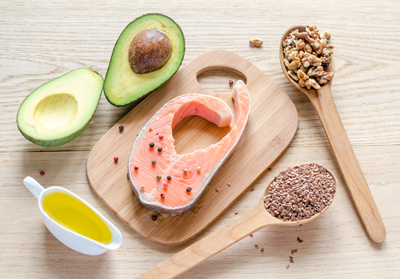|
There are two types of cholesterol in the blood, low-density lipoproteins (LDL) and high-density lipoproteins (HDL).
LDLs are tasked with carrying cholesterol throughout the body, delivering it like a messenger service to the organs and tissues that need it. But, as with blood glucose, if there is more than the body needs, the excess circulates in the blood, creating the potential for cholesterol to enter the blood vessel walls and build up beneath the lining where it becomes plaque, narrowing the vessels and creating a risk of blockages.
High-density lipoproteins, or HDLs, are known as good cholesterol because as they travel the bloodstream, they can pick up excess LDLs, delivering the bad guys to the liver, where they are broken down.
The higher your HDL level, the lower your LDL level will tend to be.
Boosting the good guys
A diet rich in fatty fish, Finnish researchers said, could make the HDL cholesterol particles bigger, so they may be more effective at sweeping out LDL.
As part of a 2014 study from Finnish researchers led by Maria Lankinen from the Department of Clinical Nutrition and Institute of Public Health at the University of Eastern Finland, researchers looked at the impact of whole grains, bilberries and fatty fish on the cholesterol levels of those with metabolic syndrome.
The group found that fatty fish especially was associated with not only a larger concentration of HDL cholesterol, but also larger particles of good cholesterol.
“The results suggest that consumption of a diet rich in … especially fatty fish causes changes in HDL particles shifting their subclass distribution toward larger particles,” researchers wrote in their study appearing in the journal PLOS ONE. “These changes may be related to known protective functions of HDL such as reverse cholesterol transport and could partly explain the known protective effects of fish consumption against atherosclerosis.”
How fatty fish works
Scientists have been looking at the benefits of the omega-3 fatty acids in fatty fish for decades, and have found that although common sense might seem to suggest that eliminating fat from the diet would reduce LDL cholesterol, by eliminating healthy fats like those found in fish, the levels of HDLs go down, too.
When LDL cholesterol leads to plaque, arteries become stiff and less flexible, leading to atherosclerosis, or hardening of the arteries, which can impact the flow of blood in arteries leading to the heart, brain, pelvis, legs, arms or kidneys, creating the potential for numerous other health problems including high blood pressure because the heart has to work harder to pump blood, as well as heart attack or stroke.
The oils found in fatty fish, even as it boosts good cholesterol levels, may also help keep blood vessels more pliable.
According to a 2009 study from researchers at California’s Loma Linda University, enhancing a low-fat diet with foods rich in omega-3s like such as salmon, sardines and herring can raise good cholesterol as much as 4 percent.
“The practical significance of the study is that eating an easy-to-incorporate amount of fatty fish can cause meaningful decreases in blood cholesterol and triglyceride even in healthy individuals,” said lead author and co-principal investigator Sujatha Rajaram, PhD, associate professor of nutrition at the university.
 Fatty Fish More effective? Fatty Fish More effective?
While most doctors recommend statins to control cholesterol levels – these drugs block the production of cholesterol in the liver – a diet rich in fatty fish may also be effective at controlling cholesterol, without the negative side effects, research has shown.
According to a 2013 study conducted by Spanish researchers, a Mediterranean diet – which features primarily fatty fish, olive oil, veggies, nuts and seeds – does a better job of lowering cholesterol than statins, which is great news for those who are concerned about the side effects of these drugs, including muscle pain, weakness and deterioration.
“Diet works,” said Dr. Ramon Estruch of Hospital Clinic in Barcelona, who led the study, which appeared in the New England Journal of Medicine. “We think diet is better than a drug.”
Other experts supported the idea that a proper diet – when followed consistently – can be as effective a tool as statin drugs, adding to the appeal of fatty fish.
Boost your omega-3s
To get the most omega-3s, choose salmon, white albacore tuna canned in water, rainbow trout, anchovies, herring, sardines and mackerel.
Just be sure to choose a healthy cooking method to maintain the heart-healthy benefits.
“The way that you prepare any of these foods makes a big difference in your blood cholesterol level,” Keecha Harris, a registered dietician with the American Dietetic Association told WebMD.com. “It’s always best to broil, grill, or steam these foods.”
If you’re concerned about fish contamination or have a hard time eating enough fish for heart health, choose a high quality fish oil supplement such as one from our Xtend-Life Omega-3 family of products, which offer greater benefits than standard fish oils because of the unique blend of Hoki and tuna oils. You can read more about what makes our unique fish oil so beneficial by clicking here to visit the Omega 3/DHA Fish Oil product page.
References:
- http://www.mayoclinic.org/diseases-conditions/high-blood-cholesterol/in-depth/hdl-cholesterol/art-20046388
- http://www.ncbi.nlm.nih.gov/pmc/articles/PMC1312230/
- http://www.heart.org/HEARTORG/Conditions/Cholesterol/AboutCholesterol/Good-vs-Bad-Cholesterol_UCM_305561_Article.jsp
- http://www.llu.edu/public-health/sphere/2009/summer/walnuts-fish.page
- http://www.telegraph.co.uk/health/healthnews/9893580/Mediterranean-diet-as-good-as-statins.html
- http://www.prevention.com/food/food-remedies/10-best-cholesterol-lowering-foods?page=2
- http://www.webmd.com/cholesterol-management/features/low-cholesterol-diet-fatty-fish
|

 Youre Not Getting Enough Vitamin B6
Youre Not Getting Enough Vitamin B6  Fish Oil Relieves Joint and Back Pain, Reducing Need for NSAIDs
Fish Oil Relieves Joint and Back Pain, Reducing Need for NSAIDs  Being Fit does not always mean Healthy
Being Fit does not always mean Healthy 
 Youre Not Getting Enough Vitamin B6
Youre Not Getting Enough Vitamin B6  Fish Oil Relieves Joint and Back Pain, Reducing Need for NSAIDs
Fish Oil Relieves Joint and Back Pain, Reducing Need for NSAIDs  Being Fit does not always mean Healthy
Being Fit does not always mean Healthy